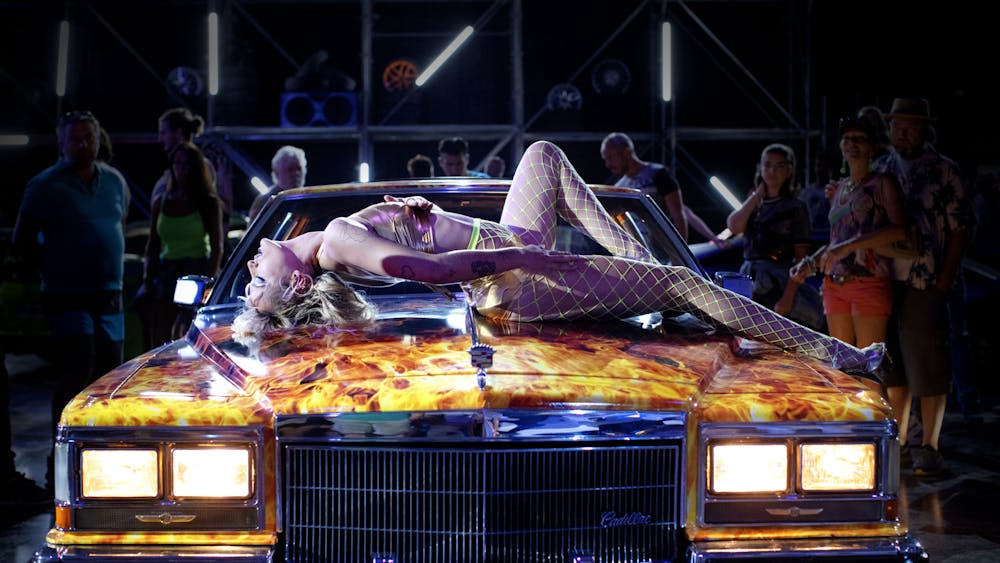“Titane” begins with young Alexia (Adèle Guigue) glowering at her father, making engine revving noises and kicking the back of the driver’s seat with an inexplicable hatred. Her father finally snaps and whips around to discipline the child, losing control of the vehicle in the process. Without a seatbelt on, the girl flies forward, smashing her head against the windowpane with a bloody splat.
Fortunately, both father and daughter survive the car crash. Planting a kiss on the window of the car that may have shielded her from certain death, Alexia leaves the hospital. Her body is now repaired with the titular titanium plate surgically inserted around her skull.
Fast forward to present day, Alexia (now played by Agathe Rousselle) is a lanky, forbidding beauty in her early thirties, strip-dancing at car shows. When a fanboy chases after her and forces a kiss, she unflinchingly drives a metal shank, doubling as a hairpin, into his ear. Pushing away the foaming corpse in disgust, Alexia re-enters the car shop to wash off his residual puke.
When she hears a mysterious banging on the locker room door, Alexia leaves, naked, to find her Cadillac parked empty just outside. She then slips into the back-seat to indulge her sexual desires for the golden, flame-painted muscle car she has long danced atop of — soon becoming pregnant with the Cadillac’s child.
It is perhaps easier to think of the film as a relentless series of visual assaults dished out to the audience: making them squirm in their chairs, cringe at grisly moments and stare in disbelief at the visceral dream-like scenes unfolding before them — Alexia’s rapturous episode with the Cadillac being one of the most obscene yet captivating sequences of “Titane.” Still, to only note the bewildering sensationalism consisting of body horror, car sex and slapstick killing sprees does not do “Titane” justice.
Winner of the Palme d’Or, the prestigious top award at the Cannes Film Festival, “Titane” is director Julia Ducournau’s second film. Her directorial debut “Raw” was another shudder-inducing body horror film delving into cannibalism and sex, but it was also a bildungsroman exploring the gradual acceptance of an ever-evolving self. “Raw” serves as a daring, horrifyingly fascinating exploration of what makes one human. “Titane” continues Ducournau’s ambitious quest to combine absurdist violence and horror with the nuances of human failings and togetherness.
After the film’s first half of slasher sequences and pulsating eroticism, “Titane” turns sharply into the less abrasive realm of father-son melodrama. Alexia, after unfortunately leaving one would-be-victim alive, is on the run. Seeing the image of a missing child, Adrien, she decidedly breaks her nose, binds her breasts and turns herself in at a police station disguised as the lost son. She is picked up by Adrien’s father, Vincent (Vincent Lindon), the austere, muscled leader of a fire-brigade, who breaks down at the unexpected reunion.
Ducournau then boldly dances with the multifaceted notions of the individual, giving Alexia and Vincent unexpected character depth. Taking on the role of Adrien, Alexia is no longer the alluring stone cold killer, but the clumsy-looking, effeminate outlier in the hyper-masculine throng of sculpted firemen led by Vincent.
Now impregnated by the Cadillac, Alexia also struggles to accept the drastic changes throughout her body — enlarging breasts leaking dark streaks of petrol in the shower, the incessant itch-itch-itch on the underside of a bulging stomach. There is no sense of control as she fights tenaciously against a physical transformation.
Through the determined, riotous struggles against her own body, Alexia’s cold-blooded facade seems to melt away, revealing a vunerable woman inexperienced with pregnancy.Often wordlessly, Rousselle portrays the distinctively female apprehension of a changing pregnant body, the vague dreams of seeing her baby birthed and the urge for a sense of belonging. Despite her sexual impulses for the cold, hard and metallic, Alexia wants more than just an unfeeling vehicle. She yearns for the warmth of a human embrace, something she finally stumbles upon through the paternal Vincent.
And the aging Vincent, his straining muscles perpetually pulled taut, similarly struggles against a body beyond his control. Pumping his aging frame with steroids, he releases a frustrated cry as he fails to complete the physical training he was able to do in his prime. Beyond the severe, haughty figure leading a crew of adonis-esque firefighters, Vincent hides a tender softness. His fragility manifests as he tries awkwardly to make “Adrien” more comfortable in their childhood bedroom and has his newfound son inject the steroids for him.
In “Titane,” Ducournau contemplates the doubles of life — cruelty blended with tenderness, eroticism and repulsion and the unbounded fluidity of gender’s male/female dichotomy. It is a film worth watching, and a film certainly worth thinking about long after one’s bewildering viewing experience.





